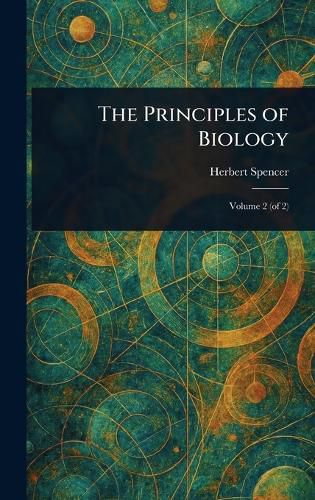Readings Newsletter
Become a Readings Member to make your shopping experience even easier.
Sign in or sign up for free!
You’re not far away from qualifying for FREE standard shipping within Australia
You’ve qualified for FREE standard shipping within Australia
The cart is loading…






This title is printed to order. This book may have been self-published. If so, we cannot guarantee the quality of the content. In the main most books will have gone through the editing process however some may not. We therefore suggest that you be aware of this before ordering this book. If in doubt check either the author or publisher’s details as we are unable to accept any returns unless they are faulty. Please contact us if you have any questions.
"The Principles of Biology, Vol. 2 of 2" by Herbert Spencer delves into the intricacies of organic life and its underlying mechanisms. A foundational work in the field of biology, this volume explores the physiological and morphological aspects of living organisms, building upon the principles of evolution and natural selection. Spencer meticulously examines the development and complexities of biological systems.
This seminal text offers a comprehensive overview of the science of biology as it was understood in Spencer's time. Readers will gain valuable insights into the historical understanding of biology and its development. This carefully prepared print republication allows access to the enduring ideas presented within, offering a valuable resource for those interested in the history of science and the evolution of biological thought. A key resource for understanding the foundations of life sciences and natural history.
This work has been selected by scholars as being culturally important, and is part of the knowledge base of civilization as we know it.
This work is in the public domain in the United States of America, and possibly other nations. Within the United States, you may freely copy and distribute this work, as no entity (individual or corporate) has a copyright on the body of the work.
Scholars believe, and we concur, that this work is important enough to be preserved, reproduced, and made generally available to the public. We appreciate your support of the preservation process, and thank you for being an important part of keeping this knowledge alive and relevant.
$9.00 standard shipping within Australia
FREE standard shipping within Australia for orders over $100.00
Express & International shipping calculated at checkout
This title is printed to order. This book may have been self-published. If so, we cannot guarantee the quality of the content. In the main most books will have gone through the editing process however some may not. We therefore suggest that you be aware of this before ordering this book. If in doubt check either the author or publisher’s details as we are unable to accept any returns unless they are faulty. Please contact us if you have any questions.
"The Principles of Biology, Vol. 2 of 2" by Herbert Spencer delves into the intricacies of organic life and its underlying mechanisms. A foundational work in the field of biology, this volume explores the physiological and morphological aspects of living organisms, building upon the principles of evolution and natural selection. Spencer meticulously examines the development and complexities of biological systems.
This seminal text offers a comprehensive overview of the science of biology as it was understood in Spencer's time. Readers will gain valuable insights into the historical understanding of biology and its development. This carefully prepared print republication allows access to the enduring ideas presented within, offering a valuable resource for those interested in the history of science and the evolution of biological thought. A key resource for understanding the foundations of life sciences and natural history.
This work has been selected by scholars as being culturally important, and is part of the knowledge base of civilization as we know it.
This work is in the public domain in the United States of America, and possibly other nations. Within the United States, you may freely copy and distribute this work, as no entity (individual or corporate) has a copyright on the body of the work.
Scholars believe, and we concur, that this work is important enough to be preserved, reproduced, and made generally available to the public. We appreciate your support of the preservation process, and thank you for being an important part of keeping this knowledge alive and relevant.